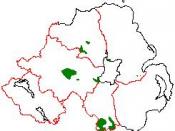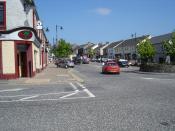Northern Economy, Finance, Industry and Trade
*Ireland is currently enjoying a period of economic growth, with output and employment rising and unemployment falling.
*Gross Domestic Product (GDP) is defined as the sum of all incomes earned from productive activity. GDP per head is taken to be a good indication of a region's relative prosperity and since 1989, GDP per head in Northern Ireland increased almost by 58%. This compares with a 49.9% increase in the UK as a whole. Having said this however, GDP per head in Northern Ireland still remains lower than the rest of the UK.
*Personal disposable income in Northern Ireland has been consistently lower than the rest of the UK, and average gross weekly earnings are also lower than those in other parts of the UK. In 1997, average gross weekly earnings in Northern Ireland were ã319.70 compared to ã372.20 in England.
*Unemployment in Northern Ireland is currently at its lowest level in 18 years.
It has fallen from 16.8% in 1986 to 8.2% in 1997.
*Manufacturing output in Northern Ireland has increased significantly over the past 5 years, and at a faster rate of growth than that of the UK as a whole. Between 1997 - 1998, Northern Ireland output increased by 2.3% in comparison to an increase of 0.2% for the UK as a whole. Industrial production in Northern Ireland increased in the 5 years between 1991-1996 by nearly 17%, whilst the rest of the UK increased by only 11.7%.
*House prices in Northern Ireland are rising at a significantly faster rate than the general UK rate of inflation. Northern Ireland house prices in the 3rd quarter of 1998 were 55.6% higher than prices in the same quarter of 1993.
*Over the past 2 years, leading supermarket chains in Britain have made...



Intresting.
The form that you wrote it in was not conventinal, but you made the information very straight forward and easy to read.
2 out of 2 people found this comment useful.